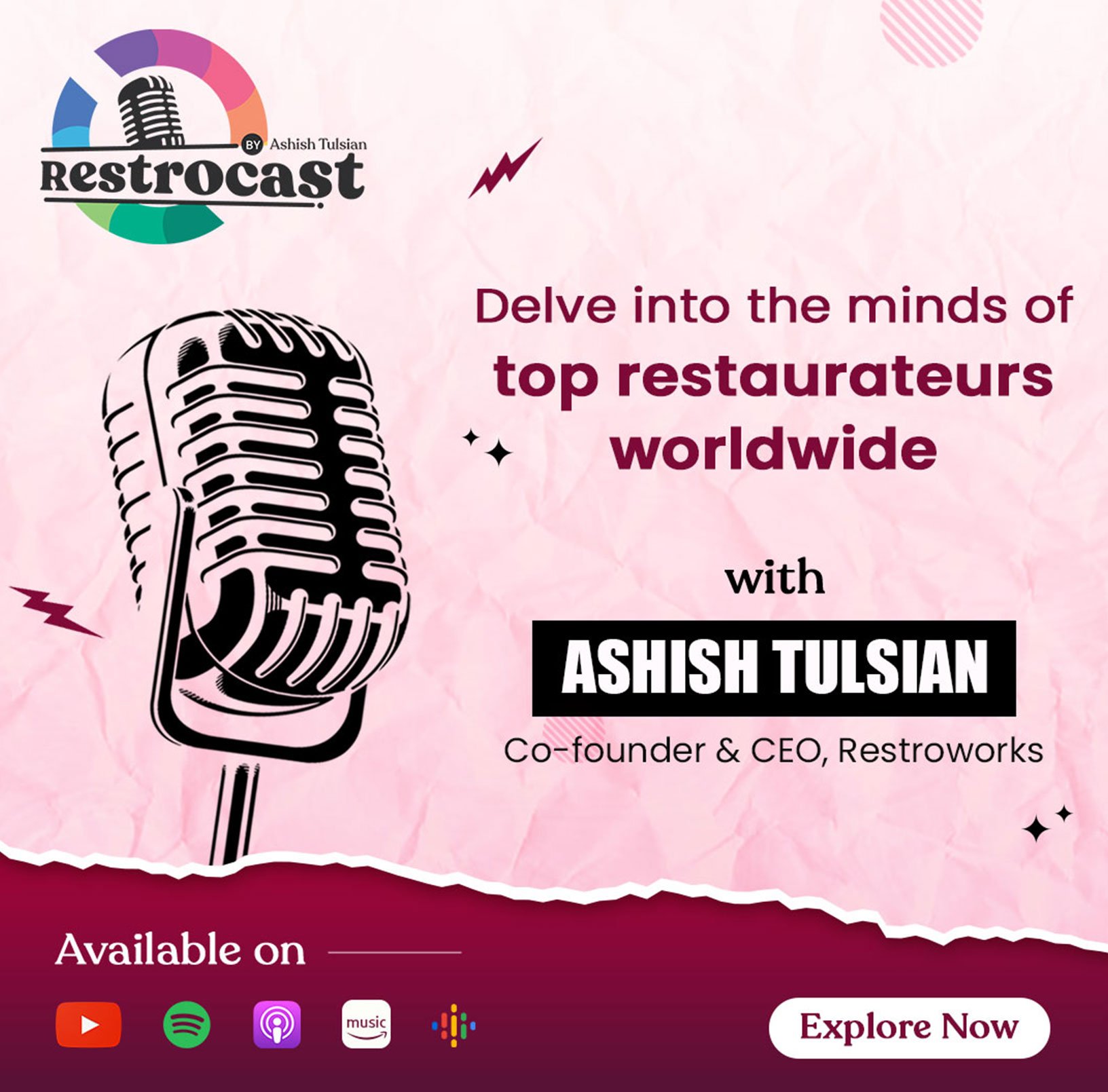
In the ever-evolving landscape of restaurant technology, leaders like Phil Crawford play a pivotal role in steering brands toward digital relevance and innovation. On a recent episode of the Restrocast Podcast, hosted by the seasoned Ashish Tulsian, we had the privilege of delving into the transformative journey of Phil Crawford, the Chief Technology Officer at CKE Restaurants. With an illustrious career spanning over two decades, Phil brings a wealth of experience and insights from his roles at renowned establishments like Shake Shack, Yard House, and Godiva Chocolate. Let’s explore the highlights of the podcast episode, where Phil shares his reflections on his career, the challenges faced, and the future of technology in the Quick-Service Restaurant (QSR) industry.
Q: Phil, your journey from a 16-year-old at Carl’s Jr. to CTO is fascinating. How did your early experiences shape your passion for technology and food?
A: I worked various roles in restaurants, from cashier to grill, all while studying technology. The fire inside me made me explore every facet of the industry. Growing up in Southern California, my first job at Carl’s Jr., and the diverse experiences in the hospitality industry built a foundation. My work at Yard House taught me leadership and innovation, shaping who I am today. Yard House was small when I started in 2002, and I handled everything tech-related. From state-of-the-art audio-visual systems to disaster recovery centers, I ensured our tech aligned with the rapid growth—5 to 46 restaurants.
Q: Your Round It Up America charity foundation is intriguing. How did technology play a role in its creation, and what impact has it made?
A: Round It Up allows diners to round up their check to the nearest dollar, contributing to food banks. We built this on the ethos of being a restaurant technology first company, emphasizing the impact tech can have beyond operations.
Q: Moving from Yard House to Shake Shack to Godiva and now Carl’s Jr, each brand has its own culture. What elements of the Shake Shack culture did you carry with you, and how has it influenced your leadership style at Carl’s Jr?
Phil Crawford: Godiva presented a unique experience in luxury retail, focusing on chocolate manufacturing and international supply chains. While retail is generally ahead in technology, the manufacturing aspect brought new challenges and opportunities, especially with robotics and supply chain models. Shake Shack’s culture emphasized standing for something good, enlightened hospitality, and treating employees with respect. I’ve carried these principles, emphasizing the importance of understanding employee needs and fostering a respectful workplace culture at Carl’s Jr. The experience at Shake Shack involved implementing innovative solutions like pager automation and custom kiosks. Those lessons influenced the strategy at Carl’s Jr, driving the implementation of infrastructure, security, loyalty, digital ordering, and more to make the brand digitally relevant.
Q: Your leadership style emphasizes humility and leading by example. Can you share specific practices or initiatives you’ve implemented to foster empowerment and a collaborative culture within your technology team?
Phil Crawford: I lead with honesty, humility, and respect, acknowledging both successes and challenges. I encourage team members to bring ideas to the table, creating a culture of empowerment and collaboration. It’s about being truthful in words and actions, and I believe people follow a leader who is true rather than always right.
Q: You’ve mentioned your engagement with franchisees and owners on a human level. How do these personal relationships contribute to the success of your technology initiatives, and what challenges have you faced in aligning technology goals with diverse stakeholders?
Phil Crawford: Personal relationships with franchisees and owners contribute significantly to success by fostering trust and alignment of technology goals. Challenges often arise from diverse perspectives, but open communication, understanding individual needs, and collaborative problem-solving help in overcoming those challenges.
Q: Phil, with the rapid advancements in restaurant technology, how do you navigate through the plethora of emerging solutions to ensure they align with your business ethos at Carl’s and Hardee’s?
Phil Crawford: Future trends in the QSR industry will likely involve continued advancements in digital technology, personalization, and seamless customer experiences. Carl’s Jr is preparing by staying agile, investing in technology infrastructure, and embracing emerging trends to meet evolving customer expectations. We focus on the guest experience first. Technology should complement the business, reduce friction, and enhance efficiency. If it aligns with our core values and addresses critical operational needs, it’s a potential fit. We’ve tried various technologies like QR for curbside, cashier station interactions, and early apps at Yard House. Some didn’t work due to timing or fit for our brand. It’s essential to align technology with our identity and core processes.
Q: What’s your perspective on AI in the restaurant industry? How do you balance the potential benefits with concerns about job displacement?
Phil Crawford: AI can enhance guest experiences, like adaptive IVR systems. It’s about making tasks more efficient, not replacing jobs. For instance, AI in drive-thrus ensures consistency in upselling, improving service scores and employee satisfaction. Innovation is crucial; you have to evolve to stay competitive. We bring new tech into the old by adopting innovative solutions while maintaining a strategy for gradual integration. The goal is to push the envelope while ensuring stability.
Q: Over the last three years, how have conversations within the industry evolved, especially in forums like RTN? Are there any notable shifts or trends?
Phil Crawford: Conversations revolve around buzzwords, sometimes lacking deep understanding. However, there’s a growing sense of sharing among industry leaders. We share competitive insights for the industry’s collective progress, even with competitors.
Q: You mentioned your pursuit of education and currently attending Harvard. Where do you see yourself in five years, considering your passion for continuous learning?
Phil Crawford: In five years, I aspire to be a CEO, bringing a technology-first perspective to the role. I believe that having a technologist as a CEO can provide a unique advantage in today’s interconnected and technology-driven world.
Q: How do you view the role of a CEO evolving, especially with technology taking center stage? Should CEOs be technology-first thinkers, even if they don’t have a deep understanding of the technical aspects?
Phil Crawford: Absolutely, CEOs need to be technology-first thinkers. They don’t have to understand every detail but must grasp the importance of technology in daily life. A technology lens can provide a distinctive advantage in leadership.
Q: As you reflect on your diverse career journey, what advice would you give to emerging leaders in the technology and restaurant industries? Are there key principles or lessons learned that you believe are essential for success?
Phil Crawford: I would advise emerging leaders to be true to themselves, lead with humility, and prioritize relationships. Embrace challenges, foster a collaborative culture, and strive to leave a positive impact. It’s about continuous learning, adapting to change, and, most importantly, recognizing the value of the team in achieving shared goals.
As the Restrocast Podcast episode unfolds, it becomes evident that Phil Crawford’s journey is more than a career—it’s a tapestry of experiences, challenges, and triumphs that have shaped him into a tech leader of formidable stature. From his early days at Carl’s Jr. to orchestrating digital transformations at global brands, Phil’s insights offer a roadmap for emerging leaders in the technology and restaurant industries. As the podcast concludes, one can’t help but be inspired by Phil’s emphasis on humility, collaboration, and the relentless pursuit of technological innovation in the ever-evolving landscape of the QSR industry.








